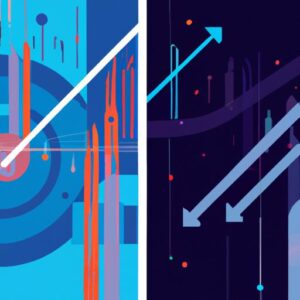Introduction
In today’s data-driven world, the demand for skilled data scientists is skyrocketing. From multinational corporations to small startups, organizations are relying on data to make informed decisions and gain a competitive edge in the market. As a result, the role of data scientists has become increasingly vital in extracting valuable insights from complex datasets. But what does it take to embark on a successful career as a data scientist? The answer lies in understanding the crucial education requirements that pave the way for success in this dynamic field.
Education plays a pivotal role in shaping the capabilities and competencies of aspiring data scientists. By acquiring the right skills and knowledge through formal education and specialized training programs, individuals can enhance their expertise and meet the evolving demands of the industry. Let’s delve into the significance of education requirements for data scientists and explore how they serve as the foundation for a rewarding career in this high-demand profession.
What is a Data Scientist
Definition and Role of a Data Scientist
A data scientist is a skilled professional who possesses the expertise to analyze and interpret complex data sets to extract valuable insights and inform strategic decision-making. By leveraging statistical analysis, machine learning algorithms, and data visualization techniques, data scientists uncover patterns, trends, and correlations that drive business growth and innovation. Their ability to translate raw data into actionable intelligence empowers organizations to optimize processes, enhance customer experiences, and gain a competitive advantage in the market.
Key Skills and Responsibilities
Data scientists are proficient in a wide range of technical skills, including proficiency in programming languages such as Python, R, and SQL, as well as expertise in data manipulation, statistical analysis, and data modeling. In addition to technical competencies, data scientists possess strong problem-solving abilities, critical thinking skills, and a keen eye for detail. Their responsibilities often involve collecting, cleaning, and organizing data, developing predictive models, and communicating findings to stakeholders in a clear and concise manner. As the bridge between data and decision-making, data scientists play a crucial role in driving innovation and driving business success through data-driven insights.
Education Requirements for Data Scientists
Bachelor’s Degree in a Related Field
To kickstart a career as a data scientist, obtaining a bachelor’s degree in a related field is often the first step. Degrees in areas such as computer science, mathematics, statistics, or information technology provide a solid foundation for understanding fundamental concepts in data analysis and programming. By completing a bachelor’s program, individuals can acquire essential skills in data manipulation, statistical analysis, and machine learning, setting the stage for further specialization in the field.
Advanced Degrees and Certifications
While a bachelor’s degree lays the groundwork, pursuing advanced degrees such as a Master’s or Ph.D. can significantly enhance one’s expertise and credibility as a data scientist. Advanced programs offer in-depth knowledge in specialized areas of data science, allowing individuals to delve into advanced algorithms, predictive modeling, and data visualization techniques. Additionally, obtaining industry-recognized certifications, such as Certified Analytics Professional (CAP) or Microsoft Certified: Data Scientist Associate, can further validate one’s skills and expertise in the field, opening up new career opportunities and advancements.
Experience and Skills
Importance of Hands-On Experience in Data Science Projects
Gaining hands-on experience in data science projects is essential for aspiring data scientists to apply theoretical knowledge to real-world scenarios. By working on practical projects, individuals can hone their analytical skills, problem-solving abilities, and critical thinking. This firsthand experience allows them to navigate through complex datasets, extract meaningful insights, and make data-driven decisions effectively. Moreover, hands-on experience provides a platform for continuous learning and skill development, enabling data scientists to stay abreast of the latest trends and technologies in the field.
Key Technical and Soft Skills Required for a Data Scientist
In addition to hands-on experience, data scientists must possess a diverse set of technical and soft skills to excel in their roles. Technical skills such as proficiency in programming languages like Python and R, expertise in statistical analysis and data visualization tools, and familiarity with machine learning algorithms are crucial for data scientists to manipulate data, build models, and derive actionable insights. Furthermore, soft skills such as communication, problem-solving, and collaboration are equally important for data scientists to effectively communicate their findings, collaborate with cross-functional teams, and drive business outcomes through data-driven strategies. By mastering a combination of technical and soft skills, data scientists can unlock their full potential and make a significant impact in the field of data science.
Job Outlook and Salary
Demand for Data Scientists in Various Industries
The demand for data scientists is not limited to a specific sector but spans across diverse industries, including finance, healthcare, technology, and marketing. In the finance industry, data scientists play a pivotal role in analyzing market trends, predicting investment outcomes, and managing risk. Healthcare organizations leverage data science to improve patient care, optimize treatment plans, and enhance operational efficiency. Moreover, technology companies rely on data scientists to develop innovative products, enhance user experiences, and drive business growth. The versatility of data science skills makes data scientists indispensable across various sectors, reinforcing their importance in today’s data-driven economy.
Average Salary Range for Data Scientists
One of the most enticing aspects of pursuing a career as a data scientist is the lucrative salary potential it offers. Data scientists command competitive salaries due to their specialized skill set and high demand in the job market. According to recent studies, the average salary range for data scientists varies based on factors such as experience, location, and industry. Entry-level data scientists can expect to earn a respectable salary, with opportunities for salary growth as they gain more experience and expertise in the field. With the increasing reliance on data-driven insights, data scientists continue to be in high demand, making it a promising career path for individuals seeking a rewarding and financially stable profession.
Conclusion
In conclusion, the path to becoming a successful data scientist begins with meeting the education requirements that equip individuals with the necessary skills and knowledge to excel in this dynamic field. From earning a bachelor’s degree in a related field to pursuing advanced degrees and specialized certifications, the journey of a data scientist is marked by continuous learning and professional development. By honing technical and soft skills, gaining hands-on experience, and staying abreast of industry trends, aspiring data scientists can position themselves for success in a competitive job market.
As the demand for data scientists continues to grow across various industries, the importance of education requirements cannot be overstated. By investing in their education and acquiring the essential competencies needed to thrive in data science roles, individuals can unlock a world of opportunities and make a meaningful impact through data-driven insights. So, if you’re passionate about harnessing the power of data to drive innovation and solve complex challenges, embarking on the educational journey to become a data scientist may be the key to unlocking a rewarding and fulfilling career path.




